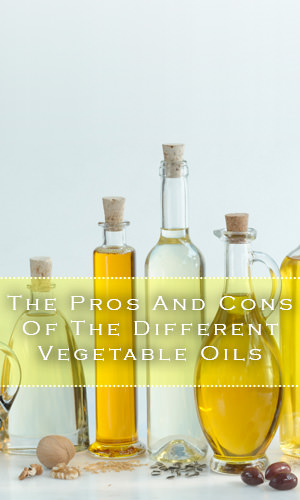
The Pros And Cons Of The Different Vegetable Oils
Posted on 30 Oct, 2021
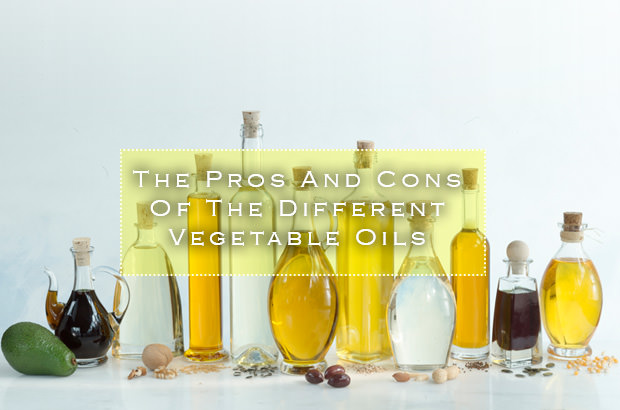
The vegetable oil aisle of the supermarket can be a slippery and expensive minefield. Here are the good and bad of each vegetable oil you are likely to encounter.
Avocado
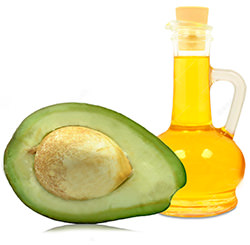 This deliciously buttery oil comes straight from avocado flesh.
This deliciously buttery oil comes straight from avocado flesh.
Benefits:
Not only is avocado oil full of good fats, it has some of those special nutrients you find in extra virgin olive oil. It’s packed with antioxidants and has anti-cancer properties.It gets the tick when it comes to cooking but store it somewhere dark to stop it going bad.
Downsides:
Avocado oil is relatively new, so little research has been done into what it does to your body. It’s also expensive.
Canola
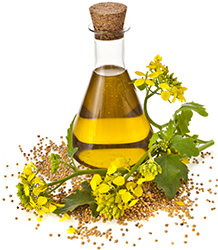 Canola oil is what comes from extracting the seeds of a canola plant. It’s inexpensive and commonly used in processed foods as well as for commercial frying.
Canola oil is what comes from extracting the seeds of a canola plant. It’s inexpensive and commonly used in processed foods as well as for commercial frying.
Benefits
As with most liquid oils, canola contains plenty of omega-3 fats, which are the good fats also found in fish. These have anti-inflammatory properties and can help reduce blood cholesterol.
Downsides
The seeds used to make canola oil can be genetically modified, which some say causes damage to the environment and aren’t good for you. Manufacturers don’t have to label their products accordingly, so it’s impossible to know if the seeds are organic or not. What’s more, the omega-3 fats in canola oil go rancid so its healing powers will depend on how well the canola oil has been kept from production line to kitchen cupboard. A US study also found a link between cooking with canola oil and reduced lung function.
Coconut
 The kernels of older coconuts are extracted to make this on-trend oil.
The kernels of older coconuts are extracted to make this on-trend oil.
Benefits
Eating coconut oil can increase the good cholesterol in your blood and it’s stable at high temperatures, making it perfect for cooking.
Downsides
It might taste like a tropical paradise but 1 tsp of coconut oil has almost 4g of saturated fat. Yes it does help your [good] cholesterol a bit, but it also raises the bad.
Corn and Safflower
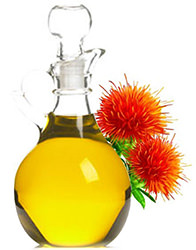 Safflower oil is extracted from the seed of the safflower, while corn is pressed for corn oil.
Safflower oil is extracted from the seed of the safflower, while corn is pressed for corn oil.
Benefits
They have a similar nutritional profile. They’re rich in omega-6 and linoleic acids, essential nutrients that can help lower the risk of heart disease and blood cholesterol. Both can handle heat so are good for frying and they’re inexpensive, too.
Downsides
Despite the high levels of omega-6, they contain very little omega-3, so their overall health benefits are minimal.
Grapeseed
 The seeds left over after making wine are pressed to make this light and mild-tasting oil.
The seeds left over after making wine are pressed to make this light and mild-tasting oil.
Benefits
It’s a good source of vitamin E and oleic acid, an unsaturated fat that’s been shown to reduce the risk of stroke and keep hunger pangs at bay. It also helps increase antioxidants in the blood. Its high smoke point and subtle taste make it good for baking, frying and homemade mayonnaise.
Downsides
Compared to other vegetable oils, grapeseed rates poorly for its relatively low level of monounsaturated fats, which tend to lower blood cholesterol.
Linseed (Flaxseed)
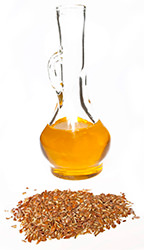 The oil of linseed, also known as flaxseed, is made by pressing the seeds of the flax plant.
The oil of linseed, also known as flaxseed, is made by pressing the seeds of the flax plant.
Benefits
Linseeds are rich in antioxidants and omega-3 fats, so they’re a top anti-inflammatory.
Downsides
This sensitive oil can go bad in contact with oxygen. A sprinkling of linseeds on oats or a salad adds a fibre boost but the oil doesn’t offer the same benefit.
Olive
 Olives are crushed and the oil is filtered and bottled. It’s best fresh and should smell a bit like green grass.
Olives are crushed and the oil is filtered and bottled. It’s best fresh and should smell a bit like green grass.
Benefits
Extra virgin olive oil is far and away the best oil – they don’t come any better. The reasons are abundant and so is the supporting research. In addition to its healthy fats that help reduce cholesterol and improve heart health, olive oil has been proven to lower blood pressure.
There have been a lot of myths about olive oil, the biggest being that you can’t cook with it. An Australian study recently proved that extra virgin olive oil has a higher smoke point (the temperature at which it smokes and starts to burn, releasing potential carcinogens) than both butter and canola oil.
Downsides
Olive oil is one of the more expensive oils. If you’re opting for anything other than extra virgin, your cholesterol levels will still benefit but those other protective powers will be diminished.
Palm
 This red-tinged oil is made by pressing the fruit of oil palm trees.
This red-tinged oil is made by pressing the fruit of oil palm trees.
Benefits
Palm oil can withstand high temperatures and is cheap to produce, which is why it’s commonly used for commercial frying and found in a lot of processed foods.
Downsides
It’s high in saturated fat and offers little nutritionally. Most importantly, its production is environmentally disastrous. The industry has been linked to deforestation, habitat destruction, animal cruelty and human rights abuses.
Peanut
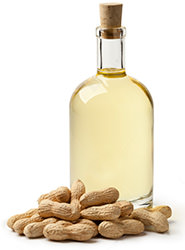 Peanut kernels are pressed to produce this tasty oil, which is often the pick for frying because it doesn’t absorb a food’s flavour.
Peanut kernels are pressed to produce this tasty oil, which is often the pick for frying because it doesn’t absorb a food’s flavour.
Benefits
Peanut oil has a lot going for it. It keeps well, cooks well and ranks well in the polyunsaturated and monounsaturated fat stakes, meaning it’s beneficial for blood cholesterol and heart health.
Downsides
It has more saturated fat than olive, avocado, sunflower and sesame oils, and can be quite expensive.
Sesame
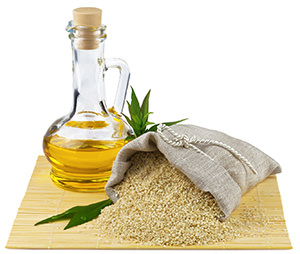 This flavourful oil comes in unrefined, refined and toasted versions. The first two have a lighter colour while the dark variety is made from toasted seeds.
This flavourful oil comes in unrefined, refined and toasted versions. The first two have a lighter colour while the dark variety is made from toasted seeds.
Benefits
Sesame oil is a nutrient powerhouse, with magnesium, iron, copper, calcium, as well as vitamins E and B6, which help break down amino acids and form haemoglobin. Because it has such a strong flavour, it’s only possible to eat a small amount, so it comes equipped with a natural obstacle to overconsumption.
Downsides
It only takes a couple of months after the bottle’s seal is broken for sesame oil to go off, so keep it in the fridge and be sure to take note of the expiry date.
Sunflower
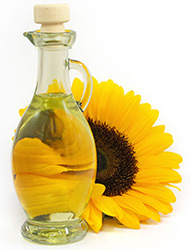 As if the beauty of sunflowers wasn’t enough, their seeds are compressed to make this helpful oil.
As if the beauty of sunflowers wasn’t enough, their seeds are compressed to make this helpful oil.
Benefits
This golden liquid is high in vitamin E, which plays a key role in supporting the immune system and has also been linked to preventing memory disorders, improved lung function and slowing the decline of people with Alzheimer’s. You’ll also find fats that are good for reducing cholesterol and keeping your heart healthy. Lastly, it keeps well and is inexpensive.
Downsides
Sunflower oil retains its nutritional goodness at high temperatures, but reusing it too many times – which is common thanks to its effectiveness at frying – can cause harmful trans fats to form.
Our Favorite Books On Eating Healthy

by Michael Moss

by John Berardi

by Jo Robinson

by Jonny Bowden

 Which Is Healthier? Red Or White Onions
Which Is Healthier? Red Or White Onions Fermented Foods And Why They Are So Good For You
Fermented Foods And Why They Are So Good For You Are eggs good or bad for you? The final verdict
Are eggs good or bad for you? The final verdict How to Pick the Healthiest Bread
How to Pick the Healthiest Bread










